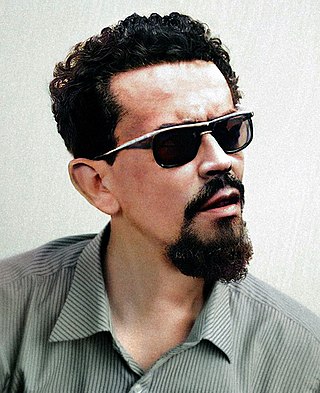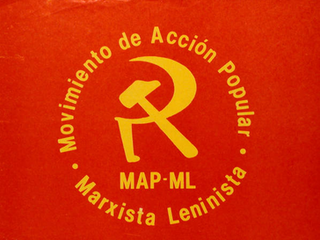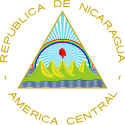
José Daniel Ortega Saavedra is a Nicaraguan politician and the 58th president of Nicaragua since January 10, 2007. Previously, he was leader of Nicaragua from July 18, 1979 to April 25, 1990, first as Coordinator of the Junta of National Reconstruction from July 19, 1979 to January 10, 1985, and then as the 54th President from January 10, 1985 to April 25, 1990. During his first term, he implemented policies to achieve leftist reforms across Nicaragua. In later years, Ortega's left-wing radical politics cooled significantly, leading him to pursue pro-business policies and even rapprochement with the Catholic Church. However, in 2022, Ortega resumed repression of the Church, and has imprisoned prelate Rolando José Álvarez Lagos.
Nicaragua is a nation in Central America. It is located about midway between Mexico and Colombia, bordered by Honduras to the north and Costa Rica to the south. Nicaragua ranges from the Caribbean Sea on the nation's east coast, and the Pacific Ocean bordering the west. Nicaragua also possesses a series of islands and cays located in the Caribbean Sea.

The Sandinista National Liberation Front is a Christian socialist political party in Nicaragua. Its members are called Sandinistas in both English and Spanish. The party is named after Augusto César Sandino, who led the Nicaraguan resistance against the United States occupation of Nicaragua in the 1930s.

The Somoza family is a political family which ruled Nicaragua for forty-three years – from 1936 to 1979. Their family dictatorship, founded by Anastasio Somoza García, was continued by his two sons Luis Somoza Debayle and Anastasio Somoza Debayle. Anastasio Somoza García served as the President of Nicaragua from 1937 until 1956. He was succeeded by his elder son, Luis Somoza Debayle, who held the presidency from 1957 to 1963. The younger Somoza son, Anastasio Somoza Debayle, had two presidential terms: 1967–1972 and 1974–1979. Although the Somozas did not hold the presidency for the full forty-three years, they continued to rule through puppet presidents and via their control of the National Guard.

The Farabundo Martí National Liberation Front is a Salvadoran political party and former guerrilla rebel group.

The Constitutionalist Liberal Party is a political party in Nicaragua.

The Nicaraguan Revolution began with rising opposition to the Somoza dictatorship in the 1960s and 1970s, the ouster of the dictatorship in 1978–79, and fighting between the government and the Contras from 1981 to 1990. The revolution revealed the country as one of the major proxy war battlegrounds of the Cold War.

The Nicaraguan Socialist Party is a political party in Nicaragua. Founded in July 1944 by Dr. Mario Flores Ortiz. PSN operated as the official communist party in the country. At the time of its foundation, PSN supported the regime of Anastasio Somoza García. PSN considered that Somoza was an anti-fascist ally.

The Republic of Nicaragua elects on the national level a head of state—the president—and a unicameral legislature. The president of Nicaragua and his or her vice-president are elected on one ballot for a five-year term by the people.

Carlos Fonseca Amador was a Nicaraguan professor, politician, writer and revolutionary who was one of the founders of the Sandinista National Liberation Front (FSLN). Fonseca was later killed in the mountains of the Zelaya Department, Nicaragua, three years before the FSLN took power. He has posthumously received the titles of National Hero of Nicaragua and Commander in Chief of the Sandinista Popular Revolution.

Popular Action Movement - Marxist–Leninist is a Hoxhaist communist party in Nicaragua that surged out of a split from the Sandinista National Liberation Front (FSLN) in the early 1970s. Since 1985 it is officially named the Marxist–Leninist Party of Nicaragua, but the original name MAP-ML is far more known and has been used when participating in elections.

Sandinista ideology or Sandinismo is a series of political and economic philosophies instituted by the Nicaraguan Sandinista National Liberation Front throughout the late twentieth century. The ideology and movement acquired its name, image and its military style from Augusto César Sandino, a Nicaraguan revolutionary leader who waged a guerrilla war against the United States Marines and the conservative Somoza National Guards in the early twentieth century. The principals of modern Sandinista ideology were mainly developed by Carlos Fonseca, inspired by the leaders of the Cuban Revolution in the 1950s. It sought to inspire socialist populism among Nicaragua's peasant population. One of these main philosophies involved the institution of an educational system that would free the population from the perceived historical fallacies spread by the ruling Somoza family. By awakening political thought among the people, proponents of Sandinista ideology believed that human resources would be available to not only execute a guerrilla war against the Somoza regime but also build a society resistant to economic and military intervention imposed by foreign entities.

General elections were held in Nicaragua on 5 November 2006. The country's voters went to the polls to elect a new President of the Republic and 90 members of the National Assembly. Daniel Ortega of the Sandinista National Liberation Front (FSLN) was elected president with 38% of the vote, defeating Eduardo Montealegre with 28%, José Rizo with 27%, Edmundo Jarquín with 6%, and Edén Pastora with 0.3%. The FSLN also emerged as the largest party in the National Assembly, winning 38 seats.

The Democratic Party of National Confidence was a Nicaraguan political party founded by Agustín Jarquín and Adán Fletes after a split from Social Christian Party (PSC) in 1986. The PDCN received legal status on appeal in 1989. It was part of the National Opposition Union (UNO) coalition in 1990 and had 5 seats in the National Assembly. Jarquín was the Sandinista National Liberation Front (FSLN) vice-presidential candidate in the 2001 elections. In 1992 the PDCN and the Popular Social Christian Party (PPSC) formed the Christian Democratic Union (UDC).

General elections were held in Nicaragua on 4 November 1984, to elect a president and parliament. Approximately 1.2 million Nicaraguans voted, representing a 75% turnout, with 94% of eligible voters registered. Impartial observers from international groupings such as the European Economic Community, religious groups sent to monitor the election, and observers from democratic nations such as Canada and Ireland concluded that the elections were generally free and fair.

General elections were held in Nicaragua on February 5, 1967 to elect a president and National Congress.
In 1979, the Sandinista National Liberation Front (FSLN) overthrew Anastasio Somoza Debayle, ending the Somoza dynasty, and established a revolutionary government in Nicaragua. Following their seizure of power, the Sandinistas ruled the country first as part of a Junta of National Reconstruction. Following the resignation of centrist members from this Junta, the FSLN took exclusive power in March 1981.

General elections were held in Nicaragua on 6 November 2011. The incumbent president Daniel Ortega, won a third term in this election, with a landslide victory.
Convergencia Nacional or the National Convergence alliance was a coalition of a number of Nicaraguan political organizations, formed in support of Daniel Ortega's bid in the presidential election of 2001. Despite losing the presidential election, the FSLN-led alliance made steady gains in the 2004 municipal elections, and Ortega was elected president in 2006. The alliance included Ortega's FSLN, Nationalist Liberal Party, Popular Conservative Alliance, Marxist–Leninist Popular Action Movement, Nicaraguan Christian Democratic Union, as well as the Unidad Social Cristiana PUSC and dissident minority factions of the Sandinista Renovation Movement, Nicaraguan Liberal Alliance, Constitutionalist Liberal Party, Nicaraguan Resistance Party and YATAMA. Majority factions of the latter 6 organizations have joined the anti-Ortega coalition Alianza PLC founded in 2008.














